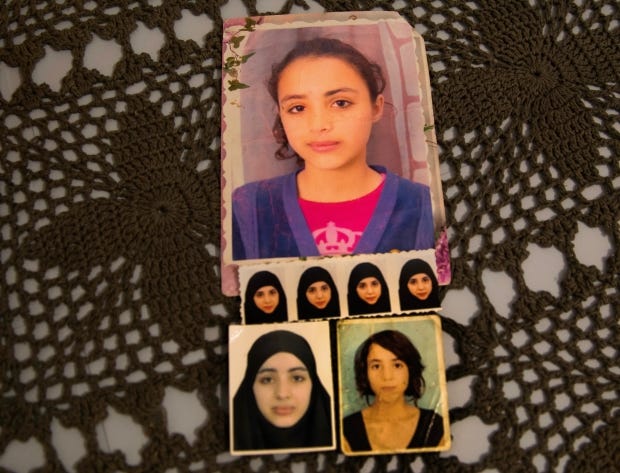Welcome to Mother’s Gonna Work it Out – a newsletter not just for mothers with children, but for everyone who cares for anyone. All previous posts are here.
On a bright April morning in 2016, I found myself in a modest house in the suburbs of Tunis, Tunisia, filming a mother whose two elder daughters had run away to join ISIS – and were being held captive by anti-IS militia in Tripoli.
The original idea was for this interview to shape a documentary about Olfa Hamrouni and her fight to bring Ghofrane and Rahma home. I wrote a feature about it for Vice, and then life took me in a different direction.
I’ve never forgotten being in the room with this mother and her two younger daughters, the atmosphere charged with fury and sadness. “Nobody talks to me from the neighbourhood. Other families don’t let their children play with mine,” she said, glancing over at Tayssir and Eya. “They say they’re terrorists.”
What has also stayed with me is the time I spent with Tayssir and Eya. We traversed the language barrier by making silly faces at each other and, when Tayssir dropped a plastic glass with a clatter while we were filming, we both got the giggles. I always wondered what would become of them.
Eight years later and I see their faces again – this time on a cinema screen. Olfa’s story has been turned into Four Daughters, an Oscar-nominated docudrama by Tunisian director Kaouther Ben Hania.
At times the film makes for surreal viewing, as Ben Hania has cast actors Ichrak Matar and Nour Karoui to play the older sisters. There are moments when Taysiir and Eya share memories with these actors as if they really are their sisters, the lines blurring between reality and fiction.
Olfa plays herself in the film, but Tunisian-Egyptian actor Hend Sabry is brought in to re-enact the more challenging scenes. She shares with the audience her trepidation at telling Olfa’s story, and she also gets into heated debates with Olfa about her treatment of her girls. “No hitting!” she instructs at one point.
As we discover more about Olfa’s childhood, one shot through with misogyny, abuse and violence, her actions towards her daughters start to make more sense – although I still had to watch certain scenes through my fingers.
The most heartbreaking moment for me was seeing footage of Ghofrane’s eight-year-old daughter, Fatma, who has spent her life in captivity thus far. Wide, dark eyes stare up at the camera, her hand clasping Ghofrane’s. In this footage, Fatma’s mother wears a full niqab so only her eyes are visible. I couldn’t tear my own eyes away from her gaze, wondering what she was thinking and how she was feeling.
We don’t find out if Ghofrane and Rania continue to be radicalised, and how Fatma is being brought up, but we do know that Olfa, along with the film’s director, are continuing to pressure the Tunisian government to repatriate her daughters and granddaughter.
The plight of the children born into ISIS is frustratingly absent from the news agenda. There are reported to be tens of thousands of women once married to IS men still being held in tented camps with their children in north-east Syria nearly five years after the fall of the terror group.
I highly recommend listening to the podcast series Bloodlines, which tells the stories of some of these women and their children.
When I first met Olfa, I wasn’t yet a mother myself. Now that I am, I feel even more distressed about the fate that’s befallen her family. In the film she calls it a curse, but there are ways to break the cycle of violence. Giving innocent children like Fatma a chance at life would be a start.





This is heartbreaking. Will have to watch the film. Thank you for writing this.